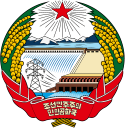- National Defence Commission of North Korea
-
North Korea 
This article is part of the series:
Politics and government of
North Korea
- Eternal President
- Supreme Leader
- Supreme People's Assembly
- Chairman of the Presidium
- National Defence Commission
- Chairman
- First Vice Chairman
- vacant
- Government
DPRK National Defense Commission Chosŏn'gŭl 조선민주주의인민공화국 국방위원회 Hancha 朝鮮民主主義人民共和國國防委員會 McCune–Reischauer Chosŏn minjujuŭi inmin konghwaguk kukpang wiwŏnhoe Revised Romanization Joseon minjujuui inmin gonghwaguk gukbang wiwonhoe The National Defense Commission of North Korea (NDC) is defined by the 1998 constitution as “the highest guiding organ of the military and the managing organ of military matters.” The Chairman of the National Defense Commission controls the armed forces and, in this state where the military pre-dominates, is the most powerful position in the country. It is currently held by Kim Jong-Il.
The First Session of the 12th Supreme People’s Assembly of the DPRK was re-elected Kim Jong Il chairman of the NDC of the DPRK while Chang Sung-taek as the deputy chairman.
History
At the Seventh Supreme People's Assembly on April 5, 1982, the Ministry of People's Armed Forces (along with the Ministry of Public Security and the State Inspection Commission) was separated from the State Administration Council, presently the DPRK Cabinet, and made responsible to the president alone. On December 24, 1991, however, the constitutional and legal requirements were muddied when it was announced that President Kim's son and heir apparent, Kim Jong Il, had been named supreme commander of the Korean People's Army, succeeding his father who was the KPA's founding commander-in-chief since its founding.
North Korea needed a legal basis if Kim Jong-il was to take full control of the military after he ascended to the position of supreme commander of the people's army, a position without legal or administrative power. The 3rd session of the Supreme People's Assembly revised the constitution in April 1992, abolishing the state president's concurrent chairmanship of the National Defence Commission, and made the commission an independent body.
The new 1992 constitution continued a trend of increasing the importance and independence of the National Defense Commission. Links to the Central People's Committee were apparently severed and the commission became directly subordinate to the Supreme People's Assembly. Under previous constitutions, the president was empowered as the supreme commander of the armed forces and as chairman of the National Defense Commission.
The 1992 state constitution deleted clauses in the 1972 constitution that stipulated that the president was supreme commander of the armed forces and chairman of the National Defense Commission, shifting powers instead to the Supreme People's Assembly and the National Defense Commission. Under the revisions, the president retains only the power to recommend the election or recall of the chairman of the National Defense Commission. The younger Kim assumed chairmanship of the commission in April 1993.
The National Defense Commission was separated from the Central Committee at the 1st session of the 9th-term Supreme People's Assembly in April, 1998, and was given a status equal to its former ruling body. The 1st session of the 10th-term Supreme People's Assembly on September 5, 1998 enhanced the status of the National Defence Commission to a top organ of the state by placing management and direction of all military affairs and defense projects under the commission's authority. The National Defense Commission, though nominally under the Supreme People's Assembly, was confirmed as the highest state body, with ultimate executive power (including responsibility for the armed forces) resting with its chairman, Kim Jong-il.
Composition of the DPRK NDC (for the 2009-2013 term, amended during 2010 WPK Party Conference)
- Chairman: Marshal of the DPRK Kim Jong-il (1993-)
- Vice Chairmen of the Commission:
- Chang Sung-taek, Secretary, WPK Administrative Department
- Vice Marshal of the KPA Kim Yong-Chun, Minister of the People's Armed Forces
- Vice Marshal of the KPA Ri Yong-mu
- General of the Army O Kuk-ryol
- Members of the Commission:
- Ju Kyu-chang, 1st Deputy Secretary, Department of Military Industries
- Vice Marshal of the KPA Ri Yong Ho, Chief of the KPA General Staff
- General of the Army Ju Sang-song, Minister of People's Security
- General of the Army Kim Jong-gak, 1st Deputy Director, KPA-GPB
- General of the Army Choe Ryoe-hae
- Colonel General U Tong-chuk
- Lieutenant General Choe Kyong-song
- Major General Kim Kyong Ok
- Reserve Major General Kim Myong-guk
- Colonel-Commandant Kim Won-hong
See also
Categories:- Politics of North Korea
- Military of North Korea
- Government of North Korea
- National security councils
Wikimedia Foundation. 2010.
